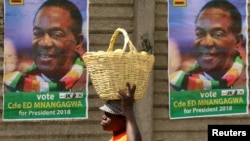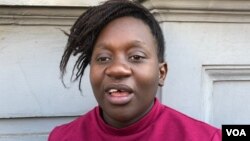Zimbabwe's president, Emmerson Mnangagwa, has set July 30 as election day. But Zimbabweans living outside the southern African nation will not be allowed to vote in those polls.
Through a government gazette published Wednesday, Mnangagwa said that on that day Zimbabweans will choose their next president as well as members of parliament and city councils.
September 8th is when a presidential runoff will be held in the event that there is clear winner in the first round.
However, Zimbabwe's high court has ruled that Zimbabweans who do not live in the country cannot take part in the elections. On Wednesday, the Constitutional Court dismissed a challenge to electoral laws which prevent Zimbabweans in the diaspora from taking part in their country’s electoral processes.
Belinda Chinowawa of the Zimbabwe Lawyers for Human Rights group said she made the application for some non-resident citizens. They had hoped Zimbabwe would join African countries like Ghana, Mozambique and South Africa in allowing their diaspora citizens to vote from the countries where they live.
“Naturally we are very disappointed because we really did believe that there is now a constitutional right to vote for all Zimbabweans, whether they are based in Zimbabwe or they are voting from abroad."
To a question from VOA about “What made you think that things would change now, in the past court has been turning down your application?” Chinowawa responded:
“Because now we have in terms of section 67 of the Constitution, we have political rights and these include the right to vote for all Zimbabwean citizens over the age of 18. So we believe that as long as our clients were not convicted of any electoral offenses, we believe that they firmly had a right to vote and that their residence in other countries should not have denied them that right.”
Over the years, millions of Zimbabweans - by some estimates a third of the population - have fled Zimbabwe due to a failing economy and human rights abuses by the government of former president Robert Mugabe, who resigned under pressure from the military last November.
The government argued it did not have the money to conduct elections throughout the world. Tawanda Kanengoni, the lawyer for the Zimbabwe Electoral Commission, speaking after the court's ruling Wednesday, said that the commission will abide by the court’s ruling.
“The position that had been taken by the commission, was that it would be abide by the decision that would be made by the court. A decision has been handed down and the commission will act accordingly.”
The electoral commission must now prepare for the polls. Mnangagwa will face a challenge by Nelson Chamisa, of the country's main opposition party, the Movement for Democratic Change.






